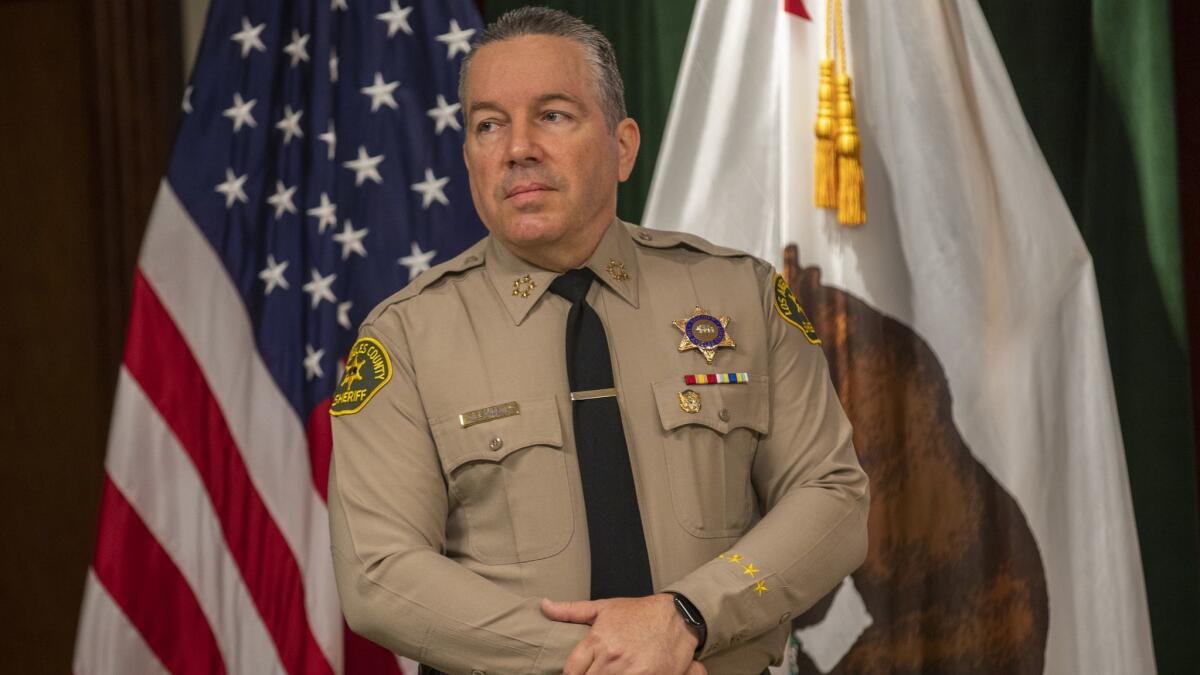Effective sheriff oversight still a work in progress

- Share via
As the Los Angeles County Board of Supervisors debated whether to call for an independent investigation into a fatal shooting by a sheriff’s deputy, Sheriff Alex Villanueva was live on Instagram providing a combination play-by-play and opposition rant.
Amid off-camera prompts whispered by aides, Villanueva told his viewers that he and his department already had the investigation into the killing of 18-year-old Andres Guardado well in hand, and that he’d asked California Atty. Gen. Xavier Becerra to monitor the probe.
“There’s no investigation that’s going to bring him back to life,” the sheriff said of Guardado, an unlicensed security guard shot dead in an alley on June 18 in an unincorporated part of the county adjacent to Gardena.
He called the board’s action a campaign tactic by Supervisor Mark Ridley-Thomas, who is soon to be termed out and is running for Los Angeles City Council, and he called Inspector General Max Huntsman the board’s “political appointee,” as he has done on previous occasions. And he displayed his cellphone, tuned in to the Board of Supervisors meeting, at which he’d requested to speak. His request was denied.
“You should find another way to campaign for City Council without using your offices for this,” Villanueva told Ridley-Thomas via his Instagram audience in a reverse-image video. “Especially in a tragedy like this. That’s just distasteful.”
What’s actually distasteful, though, is the undignified and counterproductive stonewalling the sheriff has engaged in as the board, the inspector general and the voters have attempted to impose a reasonable level of oversight.
Villanueva’s resistance is likely to face a test in court this week, as a judge will consider whether to order the sheriff to appear before the Civilian Oversight Commission, a panel the supervisors created in 2016 to oversee the Sheriff’s Department alongside the inspector general. The sheriff has flouted the nine-member panel’s order to appear and answer questions about COVID-19 in the county jails. Huntsman, too, has cited numerous instances in which he says the sheriff has not provided access to information essential to monitoring the department.
It would serve the public best, and follow a precedent set in San Diego County a quarter-century ago, for the court to uphold the subpoena and order Villanueva to appear.
At issue is whether now, at a time of growing public distrust of law enforcement, county sheriffs will be able to cling to an irresponsible and outmoded vision of unassailable power — or whether they will instead be subject to oversight.
Like their counterparts in the rest of California and much of the rest of the nation, L.A. County sheriffs are elected by voters to a job that for most of U.S. history has had no structural check or formal counterbalance on power. In 1990, though, San Diego County voters created a civilian oversight commission and gave it power to subpoena documents and witnesses in furtherance of its work. The state Supreme Court upheld the constitutionality of the commission and its subpoena power in 1994.
Los Angeles County did the same thing years later, although in dribs and drabs. The Board of Supervisors hired an inspector general, then later it created the nine-member oversight commission, and then granted the IG subpoena power. Voters then gave that power directly to the commission, which ordered the sheriff to appear in May.
Villanueva refused, dismissing the subpoena as invalid under the state Constitution and calling the attempt to question him “a public shaming endeavor.”
The commission and the inspector general provide a level of oversight that previously did not exist, and that’s a good step, but they aren’t truly independent reviewers. Although Villanueva is off-base to dismiss Huntsman and commission members as “political appointees,” they are indeed creatures of the Board of Supervisors. Becerra, for that matter, is a politician, just as Villanueva is. Even the judge who will rule in the subpoena case is an elected official. Can any person or entity be truly independent of politics?
No — but we can do better. For starters, inspectors general really ought to have a set term and not be subject to dismissal by the supervisors without cause.
In the meantime, though, in the absence of greater independence, a better balance of power will have to do. Whether L.A. County will have it — or not — is an issue that for now will be in the hands of an L.A. Superior Court judge.
More to Read
A cure for the common opinion
Get thought-provoking perspectives with our weekly newsletter.
You may occasionally receive promotional content from the Los Angeles Times.






